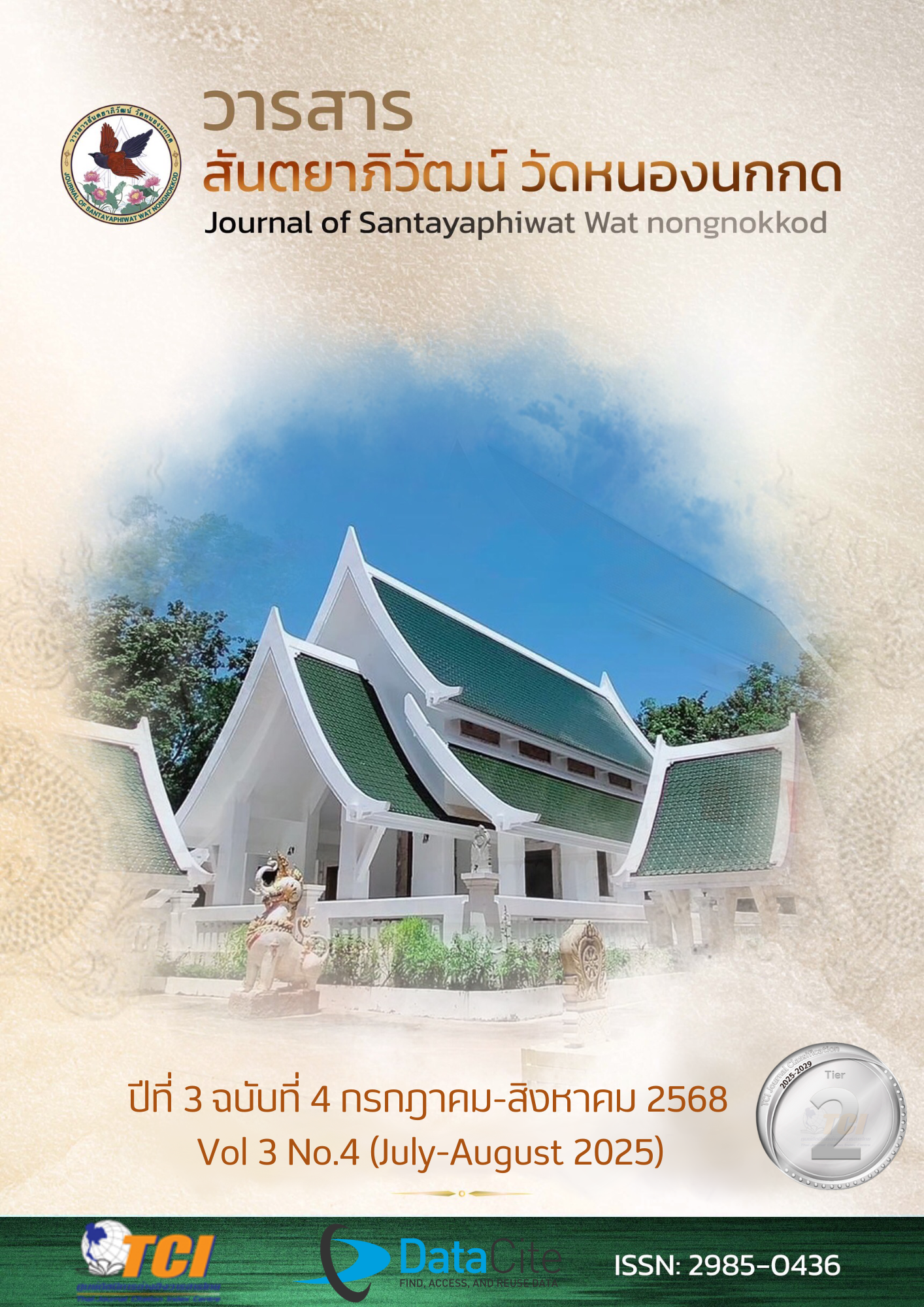ORGANIZATIONAL HEALTH DEVELOPMENT MODEL ACCORDING TO THE CONCEPT OF SUSTAINABLE DEVELOPMENT OF PRIMARY EDUCATIONAL INSTITUTIONS UNDER THE OFFICE OF THE BASIC EDUCATION COMMISSION
Keywords:
Model, Organizational Health Development, Sustainable DevelopmentAbstract
The research aims to 1) examine the components and guidelines.
2) Develop and analyze the model. 3) to assess the model. This is a mixed-methods study. The initial step of the research procedure involves examining the components and guidelines. The population consists of 400 individuals, while the sample group comprises 5 individuals interviewed. The research tools consist of questionnaires and interview forms. We examine the data by priority needs index (PNImodified) and scrutinizing the content. The second step involves constructing and analyzing the model. The research instrument is the appropriateness assessment form. The data undergo content analysis. The third step involves assessing the model. The research instruments consist of questionnaires. The data are analyzed using means and standard deviations.
The research findings indicated that 1) the components and guidelines comprised six elements. 1) principles, 2) objectives, and 3) components of organizational health development comprise four aspects: 3.1) Leadership and organizational management 3.2) Environment and Atmosphere 3.3) Staff development and well-being 3.4) resource management and organizational development, 4) guidelines for organizational health development based on sustainable development, comprised of six facets: 4.1) sustainable environmental management, 4.2) holistic health promotion, 4.3) participation and community engagement, 4.4) equity, 4.5) sustainable organizational management, 4.6) cultural diversity integration, 5) assessment criteria for the model, and 6) key success factors. 2) The model comprises six components:
1) principles, 2) objectives, 3) parts of organizational health development,
4) guidelines for organizational health development that support sustainable development, 5) criteria to evaluate the model, and 6) important factors for success, all of which are relevant, and the assessment results showed that the model was very practical and useful overall.
References
กระทรวงศึกษาธิการ. (2542). พระราชบัญญัติการศึกษาแห่งชาติ พ.ศ.2542. กรุงเทพฯ: กระทรวงศึกษาธิการ.
ธิดาวัลย์ อุ่นกอง. (2553). รูปแบบการพัฒนาสุขภาพองค์การของสถานศึกษาขั้นพื้นฐาน. ใน วิทยานิพนธ์ปรัชญาดุษฎีบัณฑิต. มหาวิทยาลัยนเรศวร.
ทรงพล เจริญคำ. (2561). หลักการและทฤษฎีการบริหารการศึกษา. (พิมพ์ครั้งที่ 10). กรุงเทพฯ : โอ เอส พริ้นติ้งเฮาส์.
บุษบา เสนีย์. (2563). รูปแบบการบริหารการจัดการเรียนรู้โดยใช้เทคโนโลยีสารสนเทศของสถานศึกษาสังกัดกรุงเทพมหานคร. ใน วิทยานิพนธ์ ปร.ด. มหาวิทยาลัยนอร์ทกรุงเทพ, กรุงเทพฯ.
ศุภรินทร์ พรมรินทร์. (2562). การพัฒนารูปแบบการบริหารงานสะเต็มศึกษาของโรงเรียนดำรงราษฎร์สงเคราะห์ จังหวัดเชียงราย. ใน ฐานข้อมูลสำเร็จรูป. ระบบสารสนเทศการวิจัยและงานวิชาการ สำนักงาน ก.ค.ศ.
สำนักงานคณะกรรมการการศึกษาขั้นพื้นฐาน. (2564). สถิติการศึกษาไทย. กรุงเทพฯ: กระทรวงศึกษาธิการ.
สำนักงานคณะกรรมการพัฒนาการเศรษฐกิจและสังคมแห่งชาติ สำนักนายกรัฐมนตรี. (2565). แผนพัฒนาเศรษฐกิจและสังคมแห่งชาติ ฉบับที่ 13 (พ.ศ.2566 - 2570), สืบค้นเมื่อ 25 กรกฎาคม 2567 จาก www.nesdb.go.
สำนักงานเลขาธิการสภาการศึกษา. (2563). รายงานสถานภาพการศึกษาแห่งชาติ. กรุงเทพฯ: กระทรวงศึกษาธิการ.
สำนักงานเลขานุการของคณะกรรมการยุทธศาสตร์ชาติ. (2561). ยุทธศาสตร์ชาติ (พ.ศ. 2561 - 2580) (พิมพ์ครั้งที่ 1). กรุงเทพฯ.
สำนักนโยบายและแผนการศึกษาขั้นพื้นฐาน สำนักงานคณะกรรมการการศึกษาขั้นพื้นฐาน. (2567). ข้อมูลบุคลากรทางการศึกษา ปีการศึกษา 2566. สืบค้นเมื่อ 3 มีนาคม 2567 จาก http://www.bopp.go.th/?page_id=2291
หยาดอัมรินทร์ ศิริขันธ์. (2562). ความสัมพันธ์ระหว่างสุขภาพองค์การของสถานศึกษากับความทุ่มเทในการปฏิบัติงานของครู. มหาวิทยาลัยราชภัฏวไลยอลงกรณ์. สืบค้นเมื่อวันที่ 25 กรกฎาคม 2567 จาก https://grad.vru.ac.th/VRU_Thesis/thesis/ file_pdf/full_58B54650 110.pdf
DeJoy, D. M., & Wilson, M. G. (2003). Organizational health promotion: Broadening the horizon of workplace health promotion. American Journal of Health Promotion, 17(5), 337–341. Retrieved July 25, 2024, from https://doi.org/10.4278/0890-1171-17.5.33
Hoy, W. K., & Tarter, C. J. (1997). The road to open and healthy schools: A handbook for change. Middle Level Leadership.
Jones, R. (2018). Communication failures in schools. Cambridge University Press.
Kim, S. (2019). Leadership and organizational health in education. Oxford University Press.
Lee, K., & Park, H. (2022). Educational effectiveness and organizational health. Wiley.
Suleiman, M., & Watts, J. (2021). Teacher burnout and organizational support. Routledge.
Thompson, A. (2020). Student mental health and school environments. Springer.
UNESCO. (2018). Education for sustainable development and the SDGs: Learning to act, learning to achieve. Advancing ESD Policy, January.









